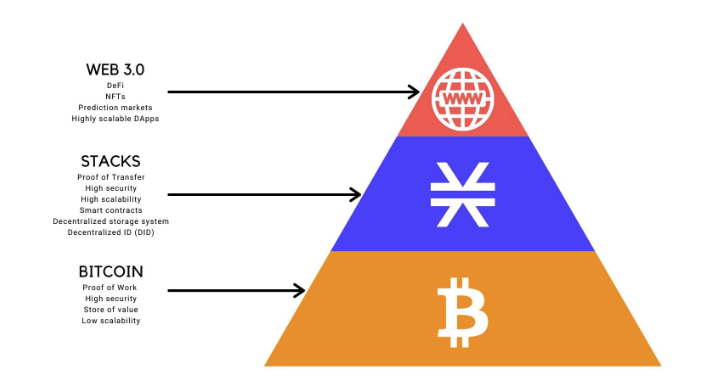
What is Stacks (STX)?
Create dApps, tokenize assets, build decentralized financial instruments in Bitcoin
Stacks (STX) is the native cryptocurrency of the Stacks blockchain, a unique layer-one blockchain that is designed to bring the power of smart contracts and decentralized applications (dApps) to Bitcoin. Unlike other blockchain networks, which build their own ecosystems from scratch, Stacks leverages Bitcoin’s unparalleled security and stability while enabling developers to build more advanced, decentralized functionalities on top of it.
https://www.stacks.co/
By integrating smart contracts with Bitcoin, Stacks aims to bridge the gap between decentralized finance (DeFi), tokenized assets, and the security of Bitcoin. Developers can use the Stacks blockchain to create dApps, tokenize assets, build decentralized financial instruments, and enable a range of digital marketplaces, all without compromising on the security features that Bitcoin offers.
Stacks operates by using a novel consensus mechanism called Proof-of-Transfer (PoX). The PoX protocol links the Stacks blockchain directly with the Bitcoin blockchain, allowing Stacks transactions to be settled on Bitcoin’s robust and secure network. This means that rather than using traditional mining to verify blocks, the Stacks blockchain relies on Bitcoin’s computational power, and miners participate in the Stacks network by “transferring” Bitcoin to earn STX tokens.
PoX ensures that the Stacks network remains secure and decentralized, with Bitcoin acting as the foundational settlement layer. This enables Stacks to harness the security of Bitcoin while expanding the functionality through smart contracts and dApps, an ability Bitcoin doesn’t natively support.
Key Features of Stacks (STX):
- Smart Contracts on Bitcoin: Stacks introduces smart contract functionality to Bitcoin through its custom Clarity language. Clarity is a purpose-built language that is secure, auditable, and designed to avoid the vulnerabilities associated with traditional smart contract languages. Since these smart contracts are settled on Bitcoin, they benefit from the highest level of security available in the blockchain space.
- Decentralized Applications (dApps): Developers can use Stacks to build decentralized applications (dApps) on top of Bitcoin. This opens up new opportunities for creating digital marketplaces, decentralized finance solutions, and even social networks that are resistant to censorship.
- Proof-of-Transfer (PoX): PoX is a unique consensus mechanism that directly connects the Stacks blockchain with Bitcoin. It allows participants to mine new STX tokens by transferring Bitcoin, creating a synergistic relationship between the two blockchains.
- Tokenization of Assets: Stacks allows for the tokenization of assets, meaning that real-world assets or digital goods can be represented as tokens on the blockchain. This opens the door to building decentralized financial instruments or enabling marketplaces for tokenized goods, all secured by Bitcoin.
- Stacking: STX token holders can participate in “stacking,” a process similar to staking in other networks. Instead of locking up their tokens, STX holders support the network and, in return, are rewarded with Bitcoin. This unique feature offers an incentive for users to support the network while also earning rewards in Bitcoin.
The STX token is central to the functioning of the Stacks ecosystem. It serves multiple roles within the network, including:
- Securing the Network: STX tokens are used to incentivize miners and participants in the PoX consensus mechanism. Miners are rewarded for verifying transactions and securing the network through a combination of Bitcoin and STX tokens.
- Powering dApps and Smart Contracts: STX tokens are used for transaction fees and for executing smart contracts within the Stacks blockchain. Any decentralized application built on Stacks requires STX tokens for operation, making it an integral part of the network’s economy.
- Governance: STX holders have a voice in key network decisions. This governance aspect allows the community to vote on important upgrades and changes to the protocol, further decentralizing control over the network.
- Staking Rewards: Users who participate in stacking (locking up STX tokens to support the network) earn Bitcoin rewards, providing a direct incentive for long-term participation and contribution to the network’s security.
The Stacks ecosystem comprises several key components that contribute to its functionality and overall vision:
- Stacks Network: The foundational layer-one blockchain that enables smart contracts and dApps to be built and secured by Bitcoin. It is the core of the Stacks ecosystem, designed to interact seamlessly with Bitcoin’s blockchain.
- STX Token: The native cryptocurrency of the Stacks network, used for everything from transaction fees and governance to incentivizing network security and mining.
- Clarity Smart Contracts: The Clarity language, developed by the Stacks team, is designed for secure, predictable smart contract execution. Clarity avoids some of the pitfalls seen in other smart contract languages, focusing on security and auditability.
- Stacks Wallets: These provide users with a secure way to store, send, and receive STX tokens. Additionally, Stacks wallets can interact with the dApps built on the Stacks network, enabling a smooth user experience for decentralized applications.
- Stacks Application: A growing ecosystem of dApps that leverage the capabilities of the Stacks blockchain. These applications can range from decentralized finance (DeFi) tools to new forms of digital marketplaces, all secured by Bitcoin.
Stacks was developed by Blockstack PBC, a public benefit corporation based in the United States. The project was founded in 2013 by Muneeb Ali and Ryan Shea, with the vision of bringing decentralized applications and smart contracts to Bitcoin’s blockchain. Blockstack PBC is responsible for the development and maintenance of the Stacks network, including the core protocol, Clarity language, and essential infrastructure tools like wallets.
Stacks (STX) is an innovative blockchain solution that brings smart contracts and decentralized applications to the world of Bitcoin. By utilizing a novel Proof-of-Transfer consensus mechanism and leveraging the security of Bitcoin, Stacks enables developers to create powerful decentralized solutions that would otherwise not be possible on Bitcoin alone. The STX token serves as the fuel for this ecosystem, enabling users to secure the network, build dApps, and even earn Bitcoin through stacking.
As the blockchain space evolves, Stacks continues to push the boundaries of what’s possible, integrating the decentralized future of dApps and tokenized assets with the most secure blockchain in existence: Bitcoin.
